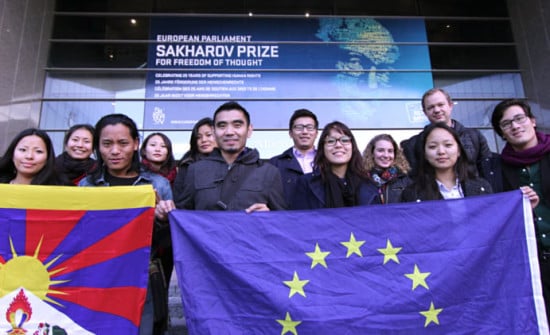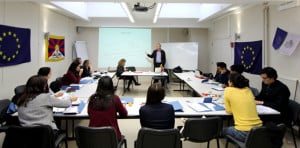
TYLP participants and ICT Brussels staff in front of the European Parliament.
The program held in Brussels was based on the TYLP organized by ICT’s US office. Over recent years, several such programs, held in Washington D.C., have aimed at training young Tibetan-Americans on how to carry the Tibet movement forward in the United States. This includes engaging these young Tibetans in the US political process (www.https://savetibet.org/2013-tibetan-youth-leadership-program), as well as in the foreign policy discourse under way in the American capital.
 TYLP participants during a campaign planning exercise.  TYLP speaker Mr. Andrew Fischer explaining the impact of Chinese development strategies on Tibet. |
ICT’s TYLP in Brussels had two main objectives: On one hand it was designed to motivate and train Tibetan students to become effective leaders within their respective Tibetan communities in Europe. On the other hand it also trained them to become advocates of the Tibetan cause at the EU level by providing them with a meaningful exposure to the EU political scene and the discourse around EU-China relations and Tibet’s role in it. During the program, participants were able to expand their understanding of the role of activists, lobbyists, NGOs and the media in influencing EU foreign policy in Brussels.
TYLP participants had the opportunity to engage in discussions with distinguished professionals working on several issues, such as EU-China relations, the EU’s human rights policy and the Tibetan movement. The program was divided between lectures by experts on China and Tibet, such as Andrew Fischer, Marie Holzman and Katia Buffetrille, and practical exercises on communications, advocacy and campaign planning. On the first day of the program, the students had a lively Skype conversation with Mr. Lodi Gyari, Executive Chairman of ICT’s Board and former Special Envoy of the Dalai Lama.
The program also included visits to EU institutions, such as the European Parliament (EP) and the European Economic and Social Committee (EESC), as well as meetings with EU officials. The participants met with Members of the European Parliament (MEPs) Leonidas Donskis (Lithuania, ALDE), Eva Lichtenberger (Austria, Greens) and Thomas Mann (Germany, EPP), as well as with former President of the EESC Mrs. Anne-Marie Sigmund. They also had the opportunity to attend the 99th meeting of the EP’s Tibet Intergroup.
The empowerment of Tibetan youth and communities has become a fundamental objective in ICT’s work. Therefore, ICT believes that it was of utmost importance to provide TYLP participants with a rich environment for exchanging information and ideas, and building a network of future leaders in the Tibetan community. Thanks to the students’ personal engagement, the program was very successful and each session resulted into passionate brainstorming discussions.

